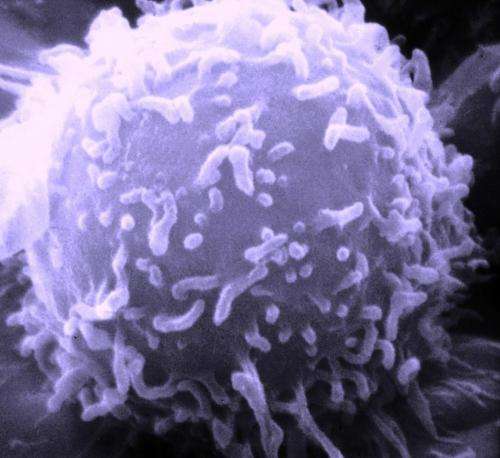Survival molecule helps cancer cells hide from the immune system

A molecule that helps cancer cells evade programmed self-destruction, an internal source of death, might also help malignant cells hide from the immune system, an external source of death.
A new study by researchers at The Ohio State University Comprehensive Cancer Center – Arthur G. James Cancer Hospital and Richard J. Solove Research Institute (OSUCCC – James) shows that a molecule called nuclear factor kappa B (NF-kB) helps cancer cells by inhibiting the immune system's ability to detect and destroy them. The molecule regulates genes that suppress immune surveillance mechanisms, including the production of cells that inhibit the immune response.
The research suggests that immune therapy for cancer might be more effective if combined with drugs that inhibit NF-kB. They also provide new details about how interactions between cancer cells and noncancer cells assist tumor growth.
The findings are published in the journal Cell Reports.
"We've long known that NF-kB promotes cancer development by subverting apoptosis, an internal safety mechanism that otherwise would cause cancer cells to self-destruct," says principal investigator Denis Guttridge, PhD, professor of molecular virology, immunology and medical genetics and of molecular and cellular biochemistry.
"This study shows that NF-kB might coordinate a network of immune-suppressor genes whose products enable tumor cells to evade adaptive immunity," he adds. "Therefore, inhibiting NF-kB will might make tumor cells more vulnerable to elimination by the immune system."
A 2009 study by the same researchers showed that NF-kB helps normal cells in DNA repair, which might prevent them from harming the body. However, it is hard to understand why such a molecule might act differently in cancer cells, where NF-kB is typically always found in an active state.
For this study, Guttridge, first author David J. Wang, who developed many of the study's concepts, and their colleagues monitored NF-kB activity during tumor development using mouse embryonic fibroblasts and two mouse models. Key technical findings include:
- During early tumor development, macrophages – innate immune cells – migrate into the tumor;
- NF-kB enables cancer cells to survive the pro-apoptotic influence of tumor necrosis factor that is released by tumor infiltrating macrophages;
- NF-kB may also regulate a number of genes related to immune suppression, particularly TGF-beta, IL-10, GM-CSF, G-CSF and VEGF.
- In cancer cells with active NF-kB, shutting down TGF-beta expression removed its immune suppressive influence and delayed tumor growth, evidence that TGF-beta is a gene regulated by NF-kB that contributes to tumor development.
"Overall, our findings demonstrate that NF-kB might play a pivotal role in enabling cells to evade surveillance by both innate and adaptive immune cells," Guttridge says.













